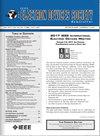An Experimentally Verified Temperature Dependent Drain Current Fluctuation Model for Low Temperature Applications
IF 2
3区 工程技术
Q3 ENGINEERING, ELECTRICAL & ELECTRONIC
引用次数: 0
Abstract
In this work, an accurate temperature-dependent drain current经实验验证的低温应用漏极电流随温度波动模型
在这项工作中,针对 18 nm 超薄体和埋藏氧化物 (UTBB) n 沟道场效应晶体管 (n-FET) 提出了一个精确的随温度变化的漏极电流 $I_{m\athrm { D}}$ 波动模型,该模型在 10 至 300 K 范围内有效。在中度反转模式下,$I_{\mathrm { D}}$ 波动在低于 100 K 时更为剧烈,而在强反转模式下,它仍然可以被电荷屏蔽效应所掩盖。低温虚拟源(CVS)器件模型用于提取和分析电流波动模型中使用的载流子密度和迁移率。在不同的反转条件下对电流波动模型进行了实验验证,结果表明该模型可用于分析和优化低温(LT)电路应用中的闪烁噪声。
本文章由计算机程序翻译,如有差异,请以英文原文为准。
求助全文
约1分钟内获得全文
求助全文
来源期刊

IEEE Journal of the Electron Devices Society
Biochemistry, Genetics and Molecular Biology-Biotechnology
CiteScore
5.20
自引率
4.30%
发文量
124
审稿时长
9 weeks
期刊介绍:
The IEEE Journal of the Electron Devices Society (J-EDS) is an open-access, fully electronic scientific journal publishing papers ranging from fundamental to applied research that are scientifically rigorous and relevant to electron devices. The J-EDS publishes original and significant contributions relating to the theory, modelling, design, performance, and reliability of electron and ion integrated circuit devices and interconnects, involving insulators, metals, organic materials, micro-plasmas, semiconductors, quantum-effect structures, vacuum devices, and emerging materials with applications in bioelectronics, biomedical electronics, computation, communications, displays, microelectromechanics, imaging, micro-actuators, nanodevices, optoelectronics, photovoltaics, power IC''s, and micro-sensors. Tutorial and review papers on these subjects are, also, published. And, occasionally special issues with a collection of papers on particular areas in more depth and breadth are, also, published. J-EDS publishes all papers that are judged to be technically valid and original.
 求助内容:
求助内容: 应助结果提醒方式:
应助结果提醒方式:


